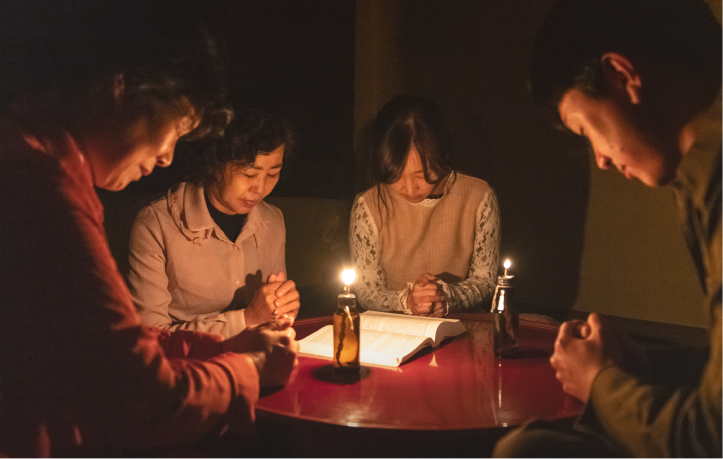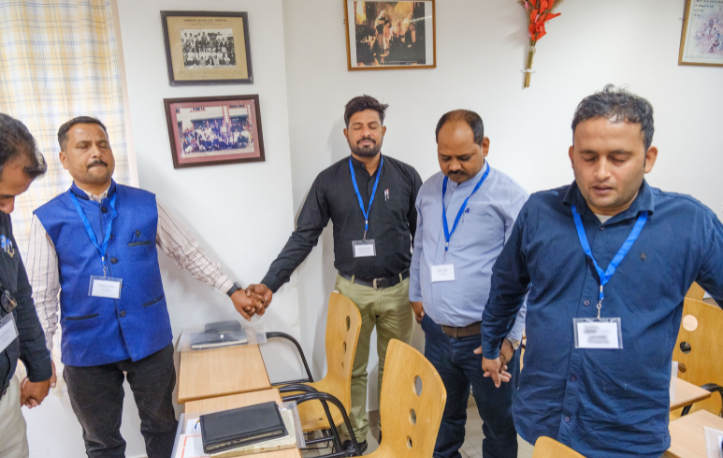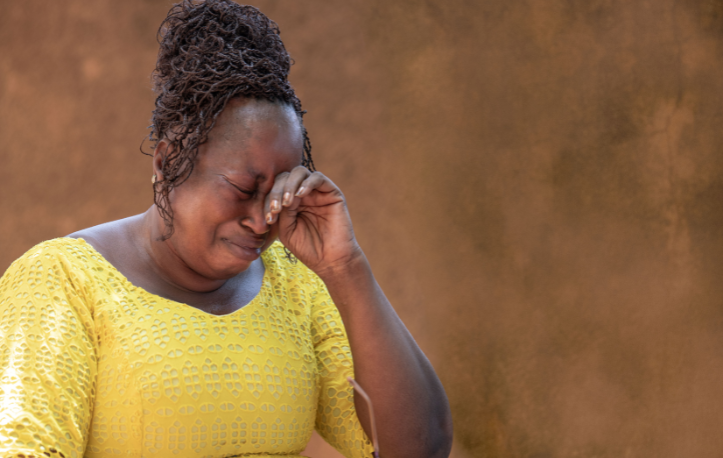The first time Eun-Ji set foot in a church, she was disgusted. The people inside sang and prayed loudly, told her lies about North Korea and, worst of all, spoke of the ‘eternal leaders’ Kim Il Sung and Kim Jong Il with brazen disrespect. It infuriated her.
She had come to the church, a Korean congregation in China, for purely financial reasons. She suspected that a woman who owed her money was there, and she needed that money. She had a family to feed during a time of severe famine in North Korea.
Hundreds of thousands of North Koreans died of starvation during the Arduous March, as the famine of the second half of the 1990s was called. Exacerbating the suffering, the government refused to accept imports or international aid. Instead, it gave tacit approval to illegal smuggling, allowing North Koreans to do whatever they could to get food in lieu of receiving the food rations and pay they should have received from the government.
For people like Eun-Ji, who was 29 at the time, smuggling was about survival.
“In 1997 and 1998,” Eun-Ji recalled, “outside there were dead bodies all over the streets [because of the famine]. My husband and I were receiving our income solely from the government. Then the government cut off our rations, and we had no ability to survive.”
Knowing that Eun-Ji had family members in China who could help her, a local woman persuaded her to take up smuggling. Most of the time, she smuggled goods that could be easily traded for food.
Then a woman asked her to take a young child from deep in North Korea to the border so the child could get much-needed medicine. For a week, Eun-Ji made arrangements to help the child, only to learn that he had already died. Then, after all of Eun-Ji’s work, the woman — along with the promised payment — disappeared.
“I think that she was running from the North Korean police because of her underground church work,” Eun-Ji said. But at the time, Eun-Ji was just angry. “I really had a hot temper back then,” she said. “I decided to get the money from her, no matter what.”
That’s what led Eun-Ji to the Korean church in China. Hoping to obtain payment from the woman, Eun-Ji spoke with the pastor and deacons of the church. They calmed her down, talked with her over a cup of coffee, prayed for her and gave her money to help her family. They also suggested a different route home to avoid border guards, directing her to another small church along the way.
A Growing Faith
The church on her new route became a regular stop on subsequent smuggling trips. For four years, people in the church shared the gospel with her and taught her what it means to follow Christ. Over time, she studied the Bible and learned how to live as a Christian and even share Christ with others.
She was still not wholly committed to following Christ, but that changed on a dark, cold night in December. While crossing the border to bring back goods for the upcoming New Year’s celebrations, her movement through the snowy forest drew the attention of some Chinese border guards. Eun-Ji began to pray silently as she had been taught in church. “When people are faced with these kinds of situations,” she said, “they tend to rely on God.”
A border guard walked into the forest near her but passed right by without seeing her, and the patrol soon moved on. Eun-Ji was sure that God had answered her prayer. “This was when I realised that the things I learned at the church were real,” she said.
During her travels, Eun-Ji recalled a song she had learned in church: “When I wandered in the world, I didn’t know the Lord. Can God forgive somebody who is a sinner like me?” The answer, she now knew, was ‘Yes!’. “When I heard those words,” Eun-Ji said, “it was like the song was written just for me and my life.”
After the famine ended and the North Korean government renewed its hard stance on smuggling, Eun-Ji continued her illegal work. Then, in the early 2000s, missionaries at the church she had been visiting for more than four years proposed a dangerous new smuggling venture: they asked if she would carry Bibles into North Korea.
Eun-Ji was hesitant. Being caught with a Bible could result in life imprisonment or even a death sentence. She had already severed ties with some Bible smugglers she knew because she didn’t want to compromise her son’s future in the military. But her younger sister-in-law, who had joined her in the smuggling enterprise and had also come to faith in Christ through the ministry of this church, was willing to take the risk.
The two women packed the Bibles deep in bags of rice so they couldn’t be seen or felt and carried them back to North Korea with instructions to keep them secret and safe. Once home, Eun-Ji and her husband wrapped the Bibles in a type of nondescript vinyl available in every North Korean market and buried them in their garden.
Food for the Stomach and the Soul
As family members came to her for food and other needs, Eun-Ji began to see them in a different light. She tried to gauge how receptive they would be to hearing the Good News that had changed her heart.
“Whenever I received something from smuggling, I always shared it with my family,” she said. “As a result, whenever I told them something, they trusted me more than Kim Il Sung.”
When Eun-Ji shared food or clothing with them, she made it clear that she was not the ultimate source of the gift. “It is not me giving you this thing,” she told them. “It is God giving it to you through me.”
If that didn’t arouse suspicion or anger, Eun-Ji would take the next step, continuing to foster her relatives’ faith. She shared the gospel with them, taught them to pray and helped them memorise Bible verses. She also encouraged them to pass the gospel on to others in the same way she had shared it with them.
In 2005, as the North Korean regime struggled to control undesired contact with the outside world and illegal trade caused by the famine, the government decreed that entire families would be exiled to the countryside if one member engaged in smuggling. Eun-Ji’s smuggling enterprise was an open secret in the community, so it wasn’t long before someone reported her, and the whole family was exiled.
Though she and her family were uprooted from their home, exile brought an unexpected blessing that increased Eun-Ji’s boldness. “After I was exiled outside of the city,” she said, “it was a good place for people to … come to find support and help from me.” Being away from the crowded conditions of the city also made discipleship easier, but the family soon faced a new threat.
An Angel in Orphan Clothes
While North Korean authorities were investigating a woman for trafficking North Korean women to Chinese men, the woman tried to shift attention away from herself by offering information about other smugglers with contacts in China. Eun-Ji was one of many people arrested and interrogated as a result of the woman’s disclosure. Eun-Ji believed it was only a matter of time before someone revealed that she had been in contact with Christians in China and had even smuggled Bibles into North Korea. She feared that her punishment would be death by firing squad.
After her arrest, the secret police locked Eun-Ji in a second-floor hotel room with iron bars over the windows. It was where they conducted interrogations, using torture to compel confessions.
Left alone in an unheated room on a freezing January day, all Eun-Ji could do was keep moving to stay warm and cry out in prayer. As darkness fell, she prayed, “Father God, it is not yet my time to go to You. I have more work to do for You. Please deliver me from this.”
Eun-Ji continued to pray throughout her second day of captivity, and in the evening, an official came in and put a small bowl of noodles on the table. He told her that he would return to interrogate her that night, and she feared they would torture a confession out of her. Overcome with terror, she fainted.
When she regained consciousness, the room was completely dark and she heard someone at the door. She thought it must be the interrogator returning, but she couldn’t understand why he was waiting outside the room. When the door finally opened, Eun-Ji was surprised to see a small child, who then ran off without entering.
“Next to the hotel, there was an orphanage,” Eun-Ji explained. “One of the orphans probably came into the inn to steal stuff.” She thinks he probably chose the room because the lights were out.
The door was now wide open, with light shining in from the hallway, but Eun-Ji didn’t dare move. She was sure the police guards must have heard the child’s movement. She remained silent for 10 minutes, staring at the open door, but no one else came to the room.
Seizing the opportunity, Eun-Ji slipped quietly down the stairs and out of the building unnoticed. She later learned that a family had thrown a party for the officials as a bribe to let a family member go, and the officials had become intoxicated, giving her the chance to escape.
For the next three months, Eun-Ji hid from authorities with help from people disillusioned with the government. “If an inspector was in the area, people would help hide me in a pigpen or something else like that,” she recalled.
She had seen executions and knew of others being sentenced to concentration camps, and her husband and children were being harassed because of her escape from custody. So knowing that they could never be safe, Eun-Ji and her family made arrangements to defect to South Korea.
“God’s Favourite Daughter”
Today, Eun-Ji and her husband serve in their local church and minister to other North Korean defectors in South Korea. She said reaching North Koreans with the gospel requires overcoming many obstacles.
“It’s not that they hate God or anything like that,” she said. “It’s because in North Korea they were forced to go to [indoctrination centres] and listen to the words of Kim Il Sung. When they come to South Korea, they come to be free of all those things. It’s not that they don’t like God, but that they don’t like institutional life.”
The nationalist ideology of the Kim family, called Juche, is another stumbling block. “Because of the Juche ideology in North Korea, trusting Kim Il Sung is [the same as] trusting God,” she said. “If they want to believe in God, it has to be secret. They cannot reveal anything about their faith. It is a real challenge to live in faith in North Korea because of this.”
Recalling how God called and protected her, Eun-Ji smiled, describing herself as “God’s favourite daughter”. She asked for prayer that she will remain faithful as she continues to seek every opportunity to do God’s will.
When Eun-Ji has the occasional opportunity to speak with family members in North Korea, she urges them to remain strong in faith. She trusts that the gospel seeds she helped plant in them will continue to bear fruit as God’s kingdom advances in North Korea.




Submit a Prayer